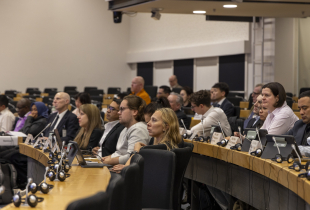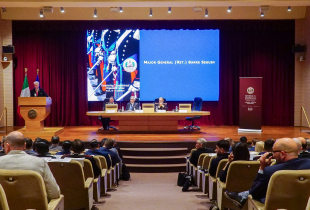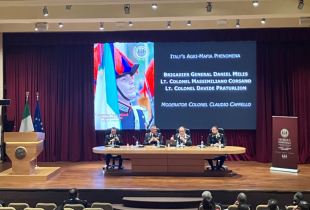
Marshall Center Alumni Workshop Reaffirms ‘Hope’ in Combating Crime
By Christine June
Public Affairs Office
George C. Marshall European Center for Security Studies
GARMISCH-PARTENKIRCHEN, Germany (June 28, 2016) — Lt. Cmdr. Fredrick Brown said he felt hope for combating crime in his country during the Global Countering Transnational Organized Crime Alumni Community of Interest Workshop held June 20 to 24 at the George C. Marshall European Center for Security Studies.
“It gives you hope because you have partners now,” said Brown, who is the commanding officer of the Military Police and Force Protection Unit of the Royal Bahamas Defense Force, and a Marshall Center alumnus. “You can call on people who have real-time experience and get the help you need.”
This workshop was an opportunity for 68 Marshall Center alumni, from 41 countries on six continents, to discuss and examine in detail national, regional and global CTOC lessons learned, effective practices, prevailing trends and current topics.
It was structured around participant-alumni presentations.
“You’ll hear from colleagues from parts of the world about which you may know very little and from potential collaborators and partners from sectors of government, with which you may not have worked with before,” said Ben Reed, the Marshall Center’s U.S. deputy director, during his welcoming remarks on the first day of the workshop. “Listen carefully to the presentations and build upon the ideas presented during seminar sessions. If you do this, I believe you’ll come away from this experience with something new in your tool kit.”
Almost all of the workshop participants were Marshall Center alumni, representing 30 resident programs in an 11-year span. The Marshall Center alumni network has more than 11,000 security-building professionals.
“The primary value of this workshop was to facilitate new relationships and cultivate existing relationships within the Marshall Center alumni network,” said Naval Criminal Investigative Service Special Agent John Fencsak, who is the deputy director for the CTOC program and coordinator for this workshop.
Participant-alumni presentations included lessons learned and effective practices from the U.S., Australia, Romania, Serbia, Mexico, Colombia and Côte d'Ivoire. Participants heard about trafficking of scarce resources in Africa and money laundering in Australia. They heard about migrant smuggling in Europe and drug trafficking organizations operating in Mexico.
“Combating Transnational Organized Crime is the biggest challenge facing countries today so it’s really important to share and to know what other countries experience and their lessons learned and effective practices,” said Maj. Tamar Salukvadze, deputy head of division for the International Relations Department of the Ministry of Internal Affairs in Georgia (country) and a Marshall Center alumna. “We must understand the challenges we are facing around the globe and work together to combat crime and terrorism.”
Each alumni participant was given the opportunity to submit their proposed lessons learned presentations to brief at the workshop. John Fencsak said he received 23 presentations.
“When we selected the seven presentations, our emphasis was on universally applicable lessons learned and effective best practices that would be relevant for our global participants,” Fencsak said. “We needed to find presentations that were relevant to Africa, Europe, South America, North America, Australia and Asia, and not necessarily speakers from all those regions.”
Fencsak said that these presentations either contained case studies, investigations, prosecutions or legislative initiatives, but that all of them highlighted successful approaches to countering transnational organized crime from which their fellow participants could draw key lessons learned and effective practices.
Marshall Center’s workshops help build a network of networks and offers a way for stakeholders and partners to engage with the alumni and elicit their feedback, said Frank Lewis, the workshop’s conference planner.
“The key for the Marshall Center is to communicate, connect, cooperate and collaborate with our alumni network,” Lewis said.
This is the sixth annual CTOC, formerly named Countering Narcotics and Illicit Trafficking Alumni Community of Interest event after successful workshops starting in 2012. These workshops are held twice a year.
Held twice a year, the CTOC resident program focuses on 21st century national security threats as a result of illicit trafficking and other criminal activities. The Marshall Center’s next CTOC course will be Aug. 10 to 25.


